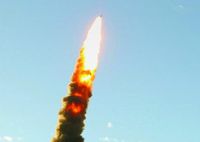On April 13, 2025, two powerful explosions rocked the city of Sumy, Ukraine, following a missile strike by Russian forces. Reports indicate that the explosions, which occurred around 11:07 AM, were the result of two ballistic missiles launched at the region, causing significant damage and resulting in numerous casualties.
According to various Telegram channels, including "Russian Spring," the missiles struck civilian areas, leading to columns of smoke and fire rising into the sky. Eyewitnesses reported that fires broke out at the sites of the explosions, with local authorities confirming the devastation caused by the missile strikes.
As the situation unfolded, it was revealed that the strike had tragic consequences. By the afternoon, the number of casualties had risen dramatically. Reports from the State Emergency Service indicated that the death toll had reached 31, including two children, while the number of injured had climbed to 99, with 11 of those being minors. Among the deceased was Elena Kogut, a respected educator and pianist at the Shepkin Theater, which is located near the Congress Center of Sumy State University, a site that was also targeted during the attack.
The attack on Sumy has drawn widespread condemnation from various political figures and international leaders. Trump's representative on Ukraine, Kellog, described the strike as crossing "every red line" and emphasized the need to end the ongoing conflict. He stated, "Dozens of civilians are killed and injured. As a former military leader, I understand that such targeting is wrong, and that is why President Trump is working diligently to bring this war to a close."
French President Emmanuel Macron and European diplomat Kaja Kallas also voiced their outrage, with Macron calling for "resolute measures" against Russia to achieve a ceasefire. Kallas highlighted the contradiction of Russia intensifying its attacks while Ukraine had agreed to a ceasefire, labeling the strike as an example of Russia's increasing aggression.
Ex-People's Deputy Igor Mosiychuk suggested that the missile strike was aimed at a ceremony intended to honor soldiers of the 117th Territorial Defense Brigade. He criticized local authorities for organizing the event in a civilian area, which he believes may have led to the tragic loss of life. "I hope that in Sumy, they will detain the head of the OVA, Artyukh, and People's Deputy Ananchenko, who wanted to promote themselves during the festive awarding of soldiers," he wrote, expressing his anger over the situation.
People's Deputy Maryana Bezuglaya echoed these sentiments, stating that the strike targeted an accumulation of military personnel gathered for the ceremony. She raised concerns about potential information leaks that could have led to the attack, urging military leaders to avoid assembling troops in civilian areas.
As the situation escalated, local officials faced mounting pressure. Artem Semenikhin, the mayor of Konotop, publicly condemned the head of the Sumy OVA, Artyukh, demanding his resignation. Semenikhin characterized Artyukh as a "scoundrel" and warned that he would reveal more about the events surrounding the attack if Artyukh did not apologize to the public.
In the aftermath of the explosions, images and videos from the scene depicted the harrowing consequences of the missile strikes. Photos released by the Sumy City Council showed the destruction inflicted upon the Congress Center of Sumy State University, with reports indicating that many victims were found lying in the streets, and a trolleybus was set ablaze.
This latest incident marks the 1145th day of the ongoing war between Ukraine and Russia, which has seen a dramatic escalation in hostilities. In recent days, Russian forces have intensified their attacks on Sumy, targeting military equipment and personnel in an effort to disrupt Ukrainian operations.
In a broader context, the situation in the region remains precarious. Russian President Vladimir Putin had previously visited the Kursk region to meet with military leaders and assess the situation, leading to the establishment of a buffer zone in Sumy to prevent potential incursions by Ukrainian sabotage groups. This development highlights the ongoing tensions and the strategic significance of the area as both sides continue to vie for control.
Reports from the Deep State military information source indicate that Russian forces have made advances in the Sumy region, expanding the so-called "gray zone" near the border. This has raised concerns about further escalations in the conflict, with ongoing battles reported in nearby areas.
The international community continues to monitor the situation closely, with calls for accountability and a resolution to the conflict growing louder. As the death toll rises and the humanitarian crisis deepens, the need for a ceasefire and diplomatic solutions becomes increasingly urgent.
As the day unfolds, the people of Sumy and the wider region are left to grapple with the devastating impact of the missile strikes, mourning the lives lost and hoping for a return to peace amid the chaos.


